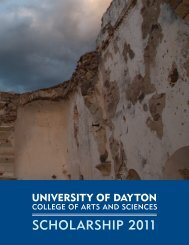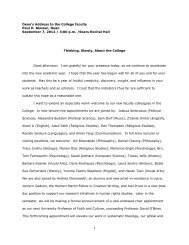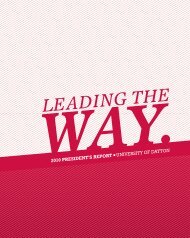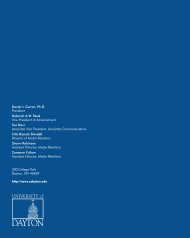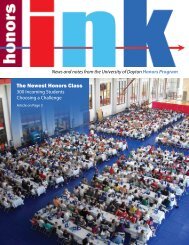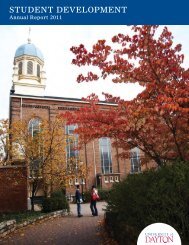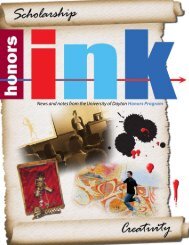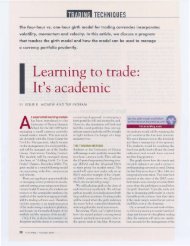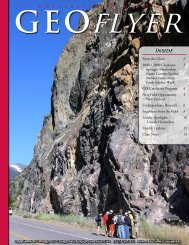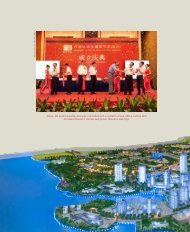HOMILY NOTES
HOMILY NOTES
HOMILY NOTES
Create successful ePaper yourself
Turn your PDF publications into a flip-book with our unique Google optimized e-Paper software.
SATURDAY, JANUARY 22, 2011<br />
OPENING OF THE CHAMINADE YEAR<br />
With the Catholic Church throughout the world, we celebrate today the<br />
Third Sunday in Ordinary Time. Although the readings are from the<br />
Sunday celebration, they are very appropriate for our celebration of<br />
Chaminade Day, the anniversary of Chaminade‟s death and his entrance<br />
into the fullness of life. That the readings are appropriate should not<br />
surprise us since Chaminade has been declared blessed by the Church<br />
indicating that he is a model for us of living the Gospel.<br />
Isaiah the prophet proclaims: The people who walked in darkness have<br />
seen a great light. He proclaims to a people in exile words of release and<br />
return. Blessed William Joseph Chaminade would have found resonance in<br />
those words. He too lived in a time of darkness; he too experienced exile.<br />
During the past few years, I have come to a greater understanding of the<br />
darkness of the times in which Fr. Chaminade lived. As the great English<br />
novelist, Charles Dickens, has written in the Tale of Two Cities:<br />
It was the best of times, it was the worst of times, it was the age of<br />
wisdom, it was the age of foolishness, it was the epoch of belief, it was<br />
the epoch of incredulity, it was the season of Light, it was the season<br />
of Darkness, it was the spring of hope, it was the winter of despair, we<br />
had everything before us, we had nothing before us, we were all going<br />
direct to heaven, we were all going direct the other way.<br />
Chaminade saw the promise of the French revolution—liberty, equality, and<br />
fraternity—degenerate into a time of chaos and violence. In my mind a<br />
great symbol of this chaos is the guillotine. People who know me well,<br />
know I do not like to watch violence in movies or on TV. I sometimes have<br />
to walk out of the room. I think there is enough violence in life that I do not<br />
need to see it portrayed over and over again. Every time I see the guillotine<br />
graphically depicted, I come to better understanding of Chaminade‟s<br />
experience of the violence of the French Revolution and am given a new
appreciation of what it meant for Chaminade to live under its threat—to see<br />
his fellow Christians subjected to this torture. No wonder he could write<br />
about the darkness. Just one example:<br />
“In our own day, the great prevailing heresy is religious indifference,<br />
which numbs souls and reduces them to a state of torpid egoism and<br />
moral degeneration. The depths of the abyss send forth dense clouds<br />
of black and pestilential smoke (Revelations 9:2) threatening to<br />
engulf the whole earth in a murky night, devoid of every good, filled<br />
with every evil, and impenetrable to the life giving rays of the Sun of<br />
justice.”<br />
But Chaminade did not curse the darkness. Instead he became a source of<br />
light. Those who knew Chaminade could repeat with the prophet Isaiah: a<br />
people who walked in darkness have seen a great light.<br />
What was that light? For Chaminade, it was to create communities of faith<br />
that would transform society—that would show that the Gospel could be<br />
lived in all of his letter and spirit in his day, in his age.<br />
As we heard in today‟s Gospel, Jesus called the apostles to a mission of<br />
teaching the good news of the kingdom through word and action. And the<br />
people Jesus called to be disciples and to carry on this task were ordinary<br />
people. They were called while fishing.<br />
This should not surprise us. God often calls very ordinary people to do<br />
extraordinary things. In the Old Testament we have the call of the prophet<br />
Elisha while he was plowing in the field; we have the prophet Amos called<br />
while “dressing” sycamore trees (I am not sure exactly what that was); we<br />
have Moses called while he was tending sheep. God called very ordinary<br />
people in the midst of very ordinary tasks.<br />
Chaminade believed that the Marianist family is also called to an apostolic<br />
vocation. We are called to do the same. We are called by our baptismal
grace to be participants in the proclamation of God‟s kingdom—the good<br />
news of the Gospel. We are called to be a light in the darkness.<br />
The letter to the Corinthians gives us a concrete example of what that good<br />
news means. It is interesting that the apostles in the gospel are called while<br />
mending their nets because mending will be an important part of their<br />
ministry. It certainly was part of Paul‟s role as an apostle to the Gentiles.<br />
Corinth was a very multiethnic/multicultural society and divisions develop.<br />
Paul proclaims to the Corinthians that there is to be unity among<br />
Christians. Paul asks for no divisions among the people; they are to have<br />
the same mind; the same purpose.<br />
Paul heard the divisions: “I belong to Cephas, I belong to Paul, I belong to<br />
Apollos, I belong to Christ.” Personal loyalties divided the community.<br />
Was Christ divided? In Paul‟s mind, the people were asking the wrong<br />
question: Who is the most important? Building one‟s ego can do that.<br />
Paul challenges the Corinthians and us. Ego is not a justification for<br />
division; should not be the cause of division. We are to have unity in<br />
essentials, respect for diversity; charity in all things<br />
Chaminade too was convinced that the communities of the Marianist family<br />
were to be without division. We have often heard the phrases from his<br />
teaching—unity without confusion, one mind and one heart.<br />
I think Paul and Chaminade would ask us today: Are we committed to<br />
building unity? Do we let our egos get in the way of unity? How do I build<br />
unity? How do I mend relationships?<br />
Earlier this week, we celebrated the birthday of Martin Luther King, Jr. He<br />
had a dream of unity. He had a dream of “the great world house.” Let me<br />
quote him:<br />
“We have inherited a large house, a great „world house,‟ in which we<br />
have to live together—black and white, Easterner and Westerner,
Gentile and Jew, Catholic and Protestant, Moslem and Hindu—a<br />
family unduly separated in ideas, cultures, and interests, who because<br />
we can never live again apart, must learn somehow to live with each<br />
other in peace.<br />
The challenge of unity was the challenge of the early church, was the<br />
challenge of the French revolution, and is still the challenge of our day.<br />
Why? Because it seems we as humans have not learned to discipline our<br />
egos. We must learn to promote the common good over personal gain and<br />
reputation. King believed the great threats to human community are<br />
racism, poverty, and war. I find his diagnosis hard to challenge. We are<br />
called to meet this challenge in our day.<br />
We come together today to celebrate the opening of the Chaminade Year.<br />
We come to honor a man who lived the Gospel in his day and age with<br />
imagination and grace. But our celebration will become empty if we do not<br />
let his vision and his life challenge us to live the Gospel in our day.<br />
More specifically our readings today call us:<br />
To be a light that shatters the darkness;<br />
To be disciples who take seriously our baptism call to proclaim the<br />
reign of God<br />
To build communities of faith that strive for the common good—for<br />
justice for all<br />
To build communities of faith that are sources of reconciliation and<br />
healing.<br />
Chaminade was a holy man. Our Marianist vocation is a magnificent call.<br />
May we be as faithful to the challenge in our day and age as Blessed<br />
Chaminade was faithful in his day and age.<br />
Amen.



